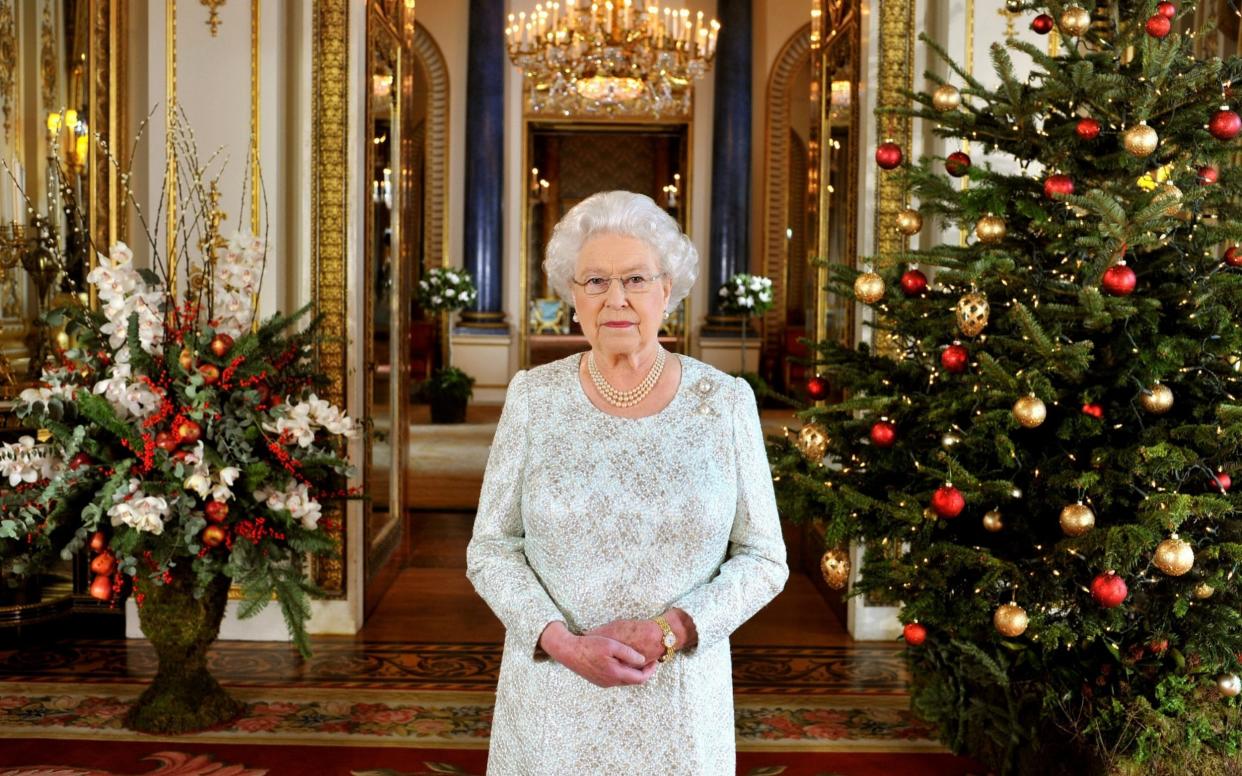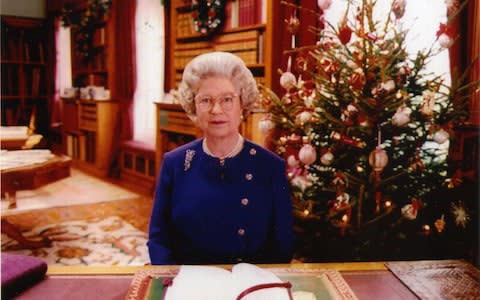Will this year’s Queen’s Speech be ‘Annus Horribilis 2’?

The Queen’s broadcast has a reputation for being the pillar of a traditional British Christmas. Yet, quietly, over the decades since her grandfather began addressing his subjects on the radio in 1932, it has been revamped many times, not least when 60 years ago it swopped format from a stiff, formal TV “sermon” delivered live direct from the royal Christmas at Sandringham to a pre-recorded and more personal message, complete with glossy footage of the Windsors at work in the year just ending.
Lately, the Queen has also been subtly modernising her own delivery to become more intimate (by her own standards). That has prompted speculation – including quotes from an anonymous Buckingham Palace source in Vanity Fair – that this year’s offering might just cause us to choke to our turkey at 3pm on Christmas Day (morning in the Corbyn household…) by including a passing reference to the “troubles” experienced these past 12 months by her son Andrew.
After all, point out those doing the speculating, the Queen has form in this regard. In late November 1992, she was famously candid about her “annus horribilis” in a pre-Christmas speech, delivered at the Guildhall. That year had also seen the Duke of York make the wrong sort of headlines by formally separating from his wife, who was subsequently photographed sucking the toes of her financial advisor next to a swimming pool.
And the Yorks weren’t the only ones making matters horribilis. Princess Anne and her first husband, Captain Mark Philips, had divorced, while the publication of Andrew Morton’s sensational Diana: Her True Story lifted the lid on the perilous state of the marriage of the Prince and Princess of Wales (who separated weeks later). And to top it all a fire had destroyed part of Windsor Castle.
At least no royal residences have gone up in flames in 2019, but there have been plenty of incendiary episodes to burnish the good name of the royal family, starting with 97-year-old Prince Philip’s driving causing havoc on a Norfolk road in January, which left two women in hospital, and continuing with the Duke and the Duchess of Sussex coming clean in October, while supposedly promoting the Queen’s beloved Commonwealth, about their struggles with the press and mental health issues, as well as their estrangement from the Cambridges.

But all were a mere puff of smoke compared to Prince Andrew crashing and burning in an interview in November with Newsnight’s Emily Maitlis about his relationship with convicted paedophile Jeffrey Epstein.
And that is all before we even get going on the Supreme Court ruling against the prorogation of Parliament that the Queen had decreed on the advice of her Prime Minister, or Netflix’s hit “factional” drama The Crown featuring a long-ago bedroom romp between a thoroughly liberated young Princess Anne and the man who was then the Duchess of Cornwall’s boyfriend (later first husband) and Prince Charles’s love rival.
Sufficient material for Annus Horribilis part two? It is certainly keeping royal commentators busy.
Vanity Fair’s Palace source spoke of the Christmas message being in first draft. “It probably hasn’t been the easiest speech to write. It has been a very difficult time behind the scenes, and morale is at a bit of a low.”
This, after all, is the one text that the Queen gets to write for herself, without guidance from her ministers. It has also become the moment when she can talk directly to 7.1 million of her subjects.
Those 2018 rating figures, across BBC, ITV and Sky where it is broadcast, were bettered only by Call the Midwife. And in 2014, the Christmas message went one better – beating Mrs Brown’s Boys to the top slot with 7.6 million viewers, but only after a rumour that she was going to use the broadcast to announce her abdication had caused bookmakers to stop taking bets on her standing down.
The switch of format, 60 years ago, from live broadcasts to pre-recorded messages at least spares the Queen one problem at the end of this turbulent year for her family, as for the nation. If the message were still coming direct from Sandringham, how would they disguise the fact that the Queen’s newest great-grandchild, Archie Harrison Mountbatten-Windsor, seventh in line to the throne, is absent? His parents, Harry and Meghan, are spending Christmas with her side of the family in Los Angeles, further proof for those seeking out clues that they were anxious to avoid Wills and Kate, who will be present.
And then, of course, with live broadcasting from Sandringham there would have been the problem of which cupboard to use to hide away Prince Andrew. He is no longer the teenaged boy seen leafing fondly through a family photograph album with his younger brother Edward in the pre-recorded 1971 Christmas message. Virginia Roberts Giuffre has very publicly alleged that she was forced by Epstein’s circle to have sex with the prince, something he has vehemently denied.

But the storm created, not least by what must be the best/worst interview of the year by a country mile, has forced the Duke of York to withdraw from public life. Perhaps he could have been sent to Pizza Express, or off on a “straightforward shooting weekend”? A royal hurrah then for the flexibility of the pre-recorded message. Veteran BBC royal correspondent Jennie Bond, though, isn’t holding her breath that this year’s will contain any sort of emotional unloading from the Queen. “Why would she want to dwell on her travails? What could she possibly hope to gain from any reference at all to the scandal around Prince Andrew?”
You might, of course, pose the same question to the prince himself as to why would he do an interview with Emily Maitlis, but the Queen, Bond points out, has better judgement. “The very most there may be is an oblique reference to some of the year’s events. She has certainly become less stuffy over the years, and more inclined to talk about her family”.
Back in 1958, when she only had Charles and Anne, the Queen declined a polite request from the broadcasters that her children be shown on screen during the Christmas message, saying she wanted them to grown up as naturally as possible. And in 1963, she missed her 3pm appointment with her subjects on TV, restricting herself to radio on the grounds she was six-months pregnant with Prince Edward.
“However much gradual evolution there has been,” insists Bond, “she still isn’t one to dwell on family problems”. Prince Harry’s biographer, Angela Levin, agrees.
“I think the Queen will neatly get round the difficulties with Harry and Meghan by mentioning baby Archie as a welcome newcomer to the next-but-two generation.”
That solves one problem, but part of the cosier tone of recent Christmas messages has been created by the Queen blending references to happy events within her own family over the past 12 months with broader reflections on the state of the world. It is a high-class version of the round robins that a dwindling number include with their Christmas cards that go something like, “grandchild number nine on the way… what a world they are coming into….”
So there is certainly some expectation that the Christmas message should mention the forthcoming nuptials of the Queen’s granddaughter, Princess Eugenie, to property developer, Eduardo Mapelli Mozzi. But that will just remind viewers of Eugenie’s dad, and the worry being expressed in Palace circles is about how this particular royal wedding will pan out as the criminal investigation in the States into Jeffrey Epstein’s circle gathers pace.
Perhaps the Queen could turn for advice on how to solve the conundrum to the BBC producer credited with revamping her Christmas messages between 1986 and 1991, none other than Sir David Attenborough. The two 93-year-olds shared a stage last month when Her Majesty presented him with the Chatham House Prize for his Blue Planet II series.
Applauding his many talents, she added: “one can’t help but feel that, for those of us of a certain generation, we can take great pleasure in proving age is no barrier to being a positive influence”. Having managed to use that influence to alert the public to the threat posed by pollution of our seas, finding a way to navigate the choppy waters threatening to capsize this year’s Royal Christmas Broadcast would be well within Sir David’s expertise.

 Yahoo News
Yahoo News 
